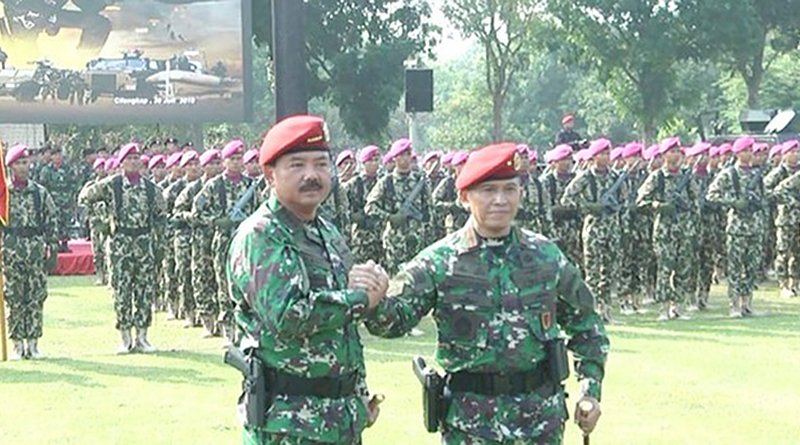Indonesia Launches Elite Military Unit With Counter-Terrorist Role
By BenarNews
By Rina Chadijah
The Indonesian military on Tuesday launched an elite unit focused on fighting violent extremism, almost a year after the armed forces campaigned for an expanded security role, despite opposition from activists who warned this could lead to human rights abuses.
The new Special Operations Command (Koopsus) consists of 500 highly trained personnel drawn from the army, navy and air force, military (TNI) chief Air Marshal Hadi Tjahjanto said during a ceremony launching the unit.
“When there are threats from inside and outside the country, the TNI commander can immediately order [Koopsus] to move quickly and with a very high success rate,” Hadi told reporters in East Jakarta.
“The involvement of the TNI in fighting terrorism is mandated in the law, especially if an action threatens the sovereignty, territorial integrity or safety of the Indonesian nation,” Hadi said.
Revisions to Indonesia’s anti-terror laws, which were passed in 2018, allowed the military to be formally involved in counter-terrorism operations.
Until now, the Indonesian national police’s elite wing, Detachment 88 (Densus 88), had been the country’s lead security unit in pursing terrorists.
Brig. Gen. Rochadi, who previously served as director of the military’s Strategic Intelligence Agency, was appointed on Tuesday as the new unit’s commander.
Earlier this month, President Joko “Jokowi” Widodo signed a presidential decree clarifying the military’s expanded role in counter-terrorism. The decree stipulates that Koopsus will coordinate with the national police in carrying out its mission.
Hadi said Koopsus was no different from a similar unit formed by former military chief Gen. Moeldoko in 2015. It will be tasked to work with the police and the National Counterterrorism Agency (BNPT), he said.
Gen. Gatot Nurmantyo, Hadi’s predecessor as TNI chief, deactivated the special unit after he took over as commander of the armed forces in July 2015, amid criticism about the lack of a legal basis for the military’s involvement in counter-terrorism.
“This is actually a continuation. At that time there was no legal framework that regulated it,” he said.
Koopsus was launched a week after BNPT chief Suhardi Alius said in a speech in Washington that the Islamic State, despite its defeat in the Middle East, had changed its terror tactics by extending its sphere of influence in Southeast Asia’s local terrorist networks.
Suhardi made the remarks hours after police in Jakarta identified a married Indonesian couple who they believe perpetrated a suicide bombing that killed 23 people at a church in the southern Philippines in January.
Intelligence Role
About 400 Koopsus personnel will carry out preventive measures, including surveillance and intelligence, while the remaining 100 members will be tasked with combating terrorist acts, Hadi said.
National police spokesman Dedi Prasetyo said the duties of Koopsus would not overlap with those of the police, particularly Densus 88.
“Densus focuses on law enforcement, while Koopssus has to do with implementation, coordination and synergy in the field of prevention,” Dedi told reporters.
Dedi said Koopsus would be needed if there was a major crisis in a public setting, including hostage-taking and a terrorist attack.
He said the military and police had proven to be capable of working together as shown in the ongoing operation to hunt militants belonging to the Islamic State-linked Eastern Indonesia Mujahedeen (MIT) group in Central Sulawesi and in anti-insurgency operations in Papua province.
Starting in early 2015, TNI commandos were involved in efforts to help hunt down MIT members and the group’s leader, Santoso, who was Indonesia’s most-wanted militant until he was killed in a firefight with security forces in July 2016.
Parliament passed the amended anti-terrorism laws in May last year following a spate of deadly terrorist-related incidents. These included a deadly prison riot involving terrorism convicts in Depok city in West Java province, and a series of suicide bombings at churches and a police headquarters in Surabaya, East Java.
Authorities blamed the attacks on Jemaah Ansharut Daulah (JAD), a local network of IS-affiliated militants.
Activists, meanwhile, have expressed fears that a renewed domestic role for the military could bring back the prominent and, at times, repressive internal security role that it played during the 32-year dictatorship of President Suharto.
Since Jokowi came to power in October 2014, the military has been given a greater role in civilian matters, including involvement in the war on drugs and the deployment of non-commissioned soldiers at the village level.
Soldiers have been deployed to support a government program to create more rice fields as part of a food self-sufficiency drive, a move that harkens back to the era of the later dictator Suharto.
Jokowi’s opponent in both the 2014 and 2019 presidential elections was Prabowo Subianto, a former general in Kopassus, the army’s special forces unit that was blamed for human rights violations during the 1990s in then Indonesian-occupied East Timor.
The BNPT, for its part, defended the military’s involvement in counter-terrorism.
“Without military intelligence, none of our efforts would have achieved satisfactory results,” Andhika Chrisnayudhanto, BNPT’s deputy for international cooperation, told reporters.
“It is important to bear in mind that in some cases, we do need military involvement,” he said.
The speaker of the House of Representatives, Bambang Soesatyo, said he hoped that the formation of Koopsus would also strengthen the monitoring of cyberspace.
“Now it is not uncommon for acts of terrorism and infiltration of foreign ideas to be launched via cyberspace, not through land, sea or air attacks,” he said.
The involvement of Koopsus will strengthen Indonesia’s fight against terrorism, said Al Chaidar, a researcher on terrorism at Malikussaleh University in Aceh province.
“If they just do surveillance with the involvement of the police, it should not be a problem,” he told BenarNews.
Ahmad Syamsudin in Jakarta contributed to this report.

